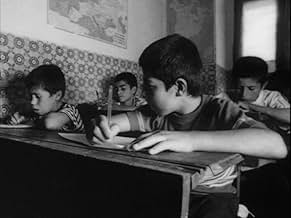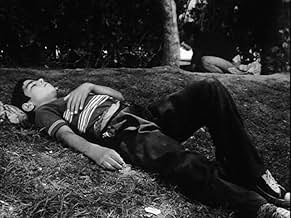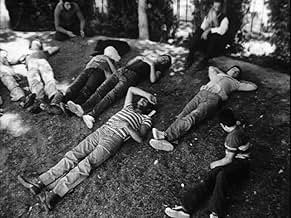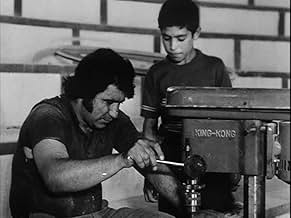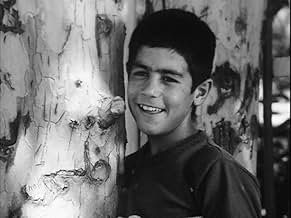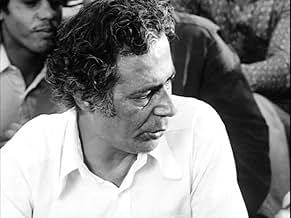Mossafer
- 1974
- 1 Std. 23 Min.
IMDb-BEWERTUNG
7,5/10
2391
IHRE BEWERTUNG
Füge eine Handlung in deiner Sprache hinzuA grade-school-age boy, neglected by his parents, lies, cheats, and steals to accumulate enough money to afford a bus ride to a large city and a ticket to see his favorite soccer team play.A grade-school-age boy, neglected by his parents, lies, cheats, and steals to accumulate enough money to afford a bus ride to a large city and a ticket to see his favorite soccer team play.A grade-school-age boy, neglected by his parents, lies, cheats, and steals to accumulate enough money to afford a bus ride to a large city and a ticket to see his favorite soccer team play.
- Regie
- Drehbuch
- Hauptbesetzung
Empfohlene Bewertungen
The Traveler (Abbas Kiarostami, 1974) Filmspotting had a positive review of the Kiarostami film Close-Up, so I thought I'd give it a go as my knowledge of Iranian films is very slight. When I got it via Netflix, I discovered there was a separate feature on the DVD (I love when that happens!) so on a whim I tried the extra out first.
The Traveler is good enough to have warranted its own DVD release, although I'm glad it was included on Close-Up. Kiarostami later referred to it as his first picture, and it's about as good a one as I've seen (short of something like Citizen Kane maybe). The main character is a young boy who will do whatever it takes (including steal and scam) to be able to afford to go to a soccer match in Tehran. I couldn't help but laugh at some of the stunts he pulled, even knowing that if he was my kid I'd have been appalled.
The director manages in The Traveler to make the boy a sympathetic character even after you see what he does: for all his questionable behavior (and who at that age doesn't exhibit questionable behavior at some point?) I relate to his loneliness and sadness, and even some of his obsessiveness in pursuing what he wants. The film reminds me of The 400 Blows (as I'm sure it's supposed to) but in some ways it is actually more successful than that Truffaut film in balancing humor with pathos. The final five minutes in particular are terrific.
If this is considered a minor work by Kiarostami, then he could well be added to my list of favorite directors soon. 8/10
The Traveler is good enough to have warranted its own DVD release, although I'm glad it was included on Close-Up. Kiarostami later referred to it as his first picture, and it's about as good a one as I've seen (short of something like Citizen Kane maybe). The main character is a young boy who will do whatever it takes (including steal and scam) to be able to afford to go to a soccer match in Tehran. I couldn't help but laugh at some of the stunts he pulled, even knowing that if he was my kid I'd have been appalled.
The director manages in The Traveler to make the boy a sympathetic character even after you see what he does: for all his questionable behavior (and who at that age doesn't exhibit questionable behavior at some point?) I relate to his loneliness and sadness, and even some of his obsessiveness in pursuing what he wants. The film reminds me of The 400 Blows (as I'm sure it's supposed to) but in some ways it is actually more successful than that Truffaut film in balancing humor with pathos. The final five minutes in particular are terrific.
If this is considered a minor work by Kiarostami, then he could well be added to my list of favorite directors soon. 8/10
The precursor of WHERE IS THE FRIEND'S HOUSE. Genius, Iran master director, the man who draw the cinema to the fullest, Abbas Kiarostami's first feature film.
If there were a certain form for the moralizing film, and it must be the children-heading-film.
The children in the cinema, according to Bazin, is the most beguiling moral motif. We are expecting this innocent, naive, impeccable face I'm moralized. Like in GERMANY YEAR ZERO, the child's face had no changes between killing his father, committing suicide, and lost of game with his friends. And it is also granted with the actions that may not expected at that ages, it's a sheer experience of reverse social identities.
In THE TRAVELER, the kid, our hero, is the existence of unbounded, struggling in this ruthless system from his own flair, which is the fundamental of the cinema-the struggle between freedom and confinement.
The unexpectedly using of musics is wonderful. The ending shot is beautifully inane. Drives me cry.
Paris Theatre.
If there were a certain form for the moralizing film, and it must be the children-heading-film.
The children in the cinema, according to Bazin, is the most beguiling moral motif. We are expecting this innocent, naive, impeccable face I'm moralized. Like in GERMANY YEAR ZERO, the child's face had no changes between killing his father, committing suicide, and lost of game with his friends. And it is also granted with the actions that may not expected at that ages, it's a sheer experience of reverse social identities.
In THE TRAVELER, the kid, our hero, is the existence of unbounded, struggling in this ruthless system from his own flair, which is the fundamental of the cinema-the struggle between freedom and confinement.
The unexpectedly using of musics is wonderful. The ending shot is beautifully inane. Drives me cry.
Paris Theatre.
Kiarostami's first feature (made some 15 years before he became the darling of the film festival circuit) tells the story of a troublesome, amoral 10 year old boy (Hassan Darabi), living in a small town in Iran, who wishes to go to Tehran to see Iran's national football team play an important match. To achieve that, he steals money from friends and neighbors through a series of scams. After a number of adventures, he finally reaches Tehran stadium at the time of the match, but there, and without giving totally away the ending, he ends up getting some sort of comeuppance (as usual by Kiarostami, there is a great final shot). One of the remarkable things of the movie is how driven is the boy in reaching his objective, never thinking how what he is doing will affect other people, even those that are closer to him. Also fascinating is the film look at Iranian football culture during the 70s (which wasn't very different to football culture in other countries at the time). Kiarostami has a very fine hand in telling a story sensitively, and he avoids the pretentiousness he showed in later films, after he has been acclaimed by European critics.
Abbas Kiarostami has such a way of tugging on one's heartstrings, and in this case it's over a boy who may not be an obvious choice to empathize with. He's already been held back a grade in school and still isn't doing his homework, and we'll soon see him stealing and running scams in a desperate attempt to raise the money necessary to go see a soccer match in Tehran, nearly 400km away. That scheme will only work if he sneaks out of the house at night without his parents' knowledge, and take an overnight bus ride to a city he's completely unfamiliar with. Hey, I thought I was crazy about sports.
True to his deep sense of humanism it doesn't feel like Kiarostami is judging anyone here, but I felt a subtle critique of the adults in this boy's life, those that have shaped him the most. His father is completely apathetic as to his lack of attention in school, and his mother is illiterate and very busy with all of her household tasks, so she struggles to check up on him too. Meanwhile, the teacher is rather mean, something we see when he tells the boy he hopes his tooth rots (when the boy is feigning a toothache), and later administering physical punishment with full permission of the mother. He takes the boy's soccer magazine because it isn't appropriate to read in class, but then sits down and begins reading it himself as another child continues with the lesson.
The simple story avoids melodrama and works because it feels so authentic - these are the kinds of dumb things kids do, with little thought to repercussions. The actor playing the main character, Hassan Darabi, does a great job, completely melting into the part, and there are all sorts of endearing little moments, like the expressions on the kids' faces while they think he's taking their portraits (he's just pocketing their money instead). Kiarostami is incredibly restrained, something I thought impressive for just his second feature film, as the big moment at the soccer game is understated, and he doesn't carry on with emotional scenes afterwards. Aside from wondering how this kid will get home and what will happen to him when he does, I wondered where he would be in ten or twenty years, as he seems resourceful and motivated for the thing he cares about, but lacks positive guidance. Wisely, Kiarostami doesn't sew things up, letting the viewer decide. Great stuff.
True to his deep sense of humanism it doesn't feel like Kiarostami is judging anyone here, but I felt a subtle critique of the adults in this boy's life, those that have shaped him the most. His father is completely apathetic as to his lack of attention in school, and his mother is illiterate and very busy with all of her household tasks, so she struggles to check up on him too. Meanwhile, the teacher is rather mean, something we see when he tells the boy he hopes his tooth rots (when the boy is feigning a toothache), and later administering physical punishment with full permission of the mother. He takes the boy's soccer magazine because it isn't appropriate to read in class, but then sits down and begins reading it himself as another child continues with the lesson.
The simple story avoids melodrama and works because it feels so authentic - these are the kinds of dumb things kids do, with little thought to repercussions. The actor playing the main character, Hassan Darabi, does a great job, completely melting into the part, and there are all sorts of endearing little moments, like the expressions on the kids' faces while they think he's taking their portraits (he's just pocketing their money instead). Kiarostami is incredibly restrained, something I thought impressive for just his second feature film, as the big moment at the soccer game is understated, and he doesn't carry on with emotional scenes afterwards. Aside from wondering how this kid will get home and what will happen to him when he does, I wondered where he would be in ten or twenty years, as he seems resourceful and motivated for the thing he cares about, but lacks positive guidance. Wisely, Kiarostami doesn't sew things up, letting the viewer decide. Great stuff.
Kiarostami's first feature film. If you've seen any of his later children's movies (e.g., Where Is the Friend's Home?), you'll definitely recognize this as from the same filmmaker. I didn't think it was particularly good, though. Hassan Darabi stars as Quassem, a 12 year-old boy who spends his entire life getting in trouble at school or with his nagging mother. He is kind of a bad boy, and pretty much deserves whatever he gets. The story revolves around Quassem trying to get enough money to attend a soccer match in Tehran. It's hard to really like the film because Quassem is such a brat. He inspires little sympathy. Yes, he does get his comeuppance, and that final bit of the film is sort of satisfying, but there's not much to the film otherwise. Most of it consists of Quassem and a friend bilking the people around them for pocket change, with maybe a good quarter of the film consisting of his annoying mother bitching him out about not doing his homework. This is now available from Criterion, on the Close-Up DVD (or at least the Blu Ray).
Wusstest du schon
- WissenswertesThis film is featured as a bonus on "Close-Up", released by the Criterion Collection, spine #519.
- VerbindungenFollowed by Safari be Diare Mosafer (1993)
Top-Auswahl
Melde dich zum Bewerten an und greife auf die Watchlist für personalisierte Empfehlungen zu.
- How long is The Traveler?Powered by Alexa
Details
- Erscheinungsdatum
- Herkunftsland
- Offizieller Standort
- Sprache
- Auch bekannt als
- The Traveler
- Drehorte
- Produktionsfirma
- Weitere beteiligte Unternehmen bei IMDbPro anzeigen
- Laufzeit
- 1 Std. 23 Min.(83 min)
- Farbe
- Sound-Mix
- Seitenverhältnis
- 1.37 : 1
Zu dieser Seite beitragen
Bearbeitung vorschlagen oder fehlenden Inhalt hinzufügen

